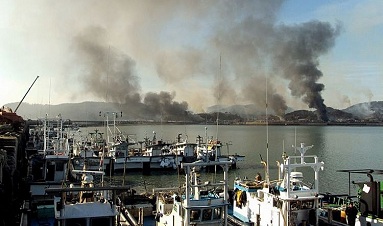Iran-Korea nuclear lies, orders from Tel Aviv
[Poverty in Chongjin - North Korea -Chongjin is the third town of North Korea. It is an industrial place where very few foreigners were allowed to go. [F]rom my hotel room, in the center of the town, I could see hundreds of people going to work in the early morning, carrying packs of heavy stones to rebuild the roads. During the hunger in the 90's hundred thousands died in this area. Image + Text: Eric Lafforgue (flickr)]
Two imaginary nuclear programs, one criminal conspiracy
Former President George W. Bush planned to invade Iran in 2007, even though America’s military was exhausted and overstretched by two unsuccessful wars. His own popularity, at a real 8%, was the reason, that and the economic collapse that he was trying to push back until he left office. He believed a war would have saved his presidency, buried the $3 trillion dollars stolen by his friends and given him a legacy to be proud of, even if every family in America suffered.
Bush brazenly admits prettymuch exactly these things in his ghost written autobiography, an incoherent rant, that rambles between blithering and megalomaniac delusion . The only thing that stopped this disaster was the National Intelligence Assessment, (NIE) that proved categorically, that Iran had no nuclear weapons program whatsoever. Even then, Bush tried to hide this report and demanded that falsified intelligence be created as he had done for 9/11, Afghanistan and Iran. However, as a lame duck and failed president, nobody listened. Integrity won out over insanity, greed and corruption this time. It wouldn’t last.




























